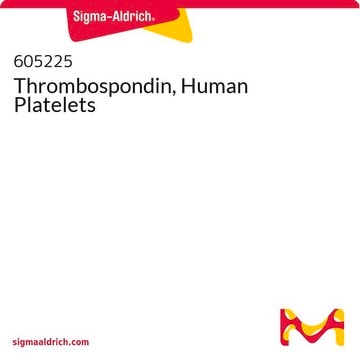SRP4805
Thrombospondin human
recombinant, expressed in baculovirus infected Sf9 cells, ≥98% (SDS-PAGE)
Synonym(s):
THBS, THBS1, TSP, TSP1, Thrombospondin-1
About This Item
Recommended Products
biological source
human
recombinant
expressed in baculovirus infected Sf9 cells
assay
≥98% (SDS-PAGE)
form
lyophilized powder
mol wt
~180.0 kDa
packaging
pkg of 10 μg
pkg of 50 μg
storage condition
avoid repeated freeze/thaw cycles
impurities
endotoxin, tested
NCBI accession no.
shipped in
wet ice
storage temp.
−20°C
Gene Information
human ... TSP1(7057)
General description
Application
Biochem/physiol Actions
Physical form
mM NaCl and 0.1% BSA.
Reconstitution
Storage Class
13 - Non Combustible Solids
wgk_germany
nwg
flash_point_f
Not applicable
flash_point_c
Not applicable
Choose from one of the most recent versions:
Already Own This Product?
Find documentation for the products that you have recently purchased in the Document Library.
Active Filters
Our team of scientists has experience in all areas of research including Life Science, Material Science, Chemical Synthesis, Chromatography, Analytical and many others.
Contact Technical Service







